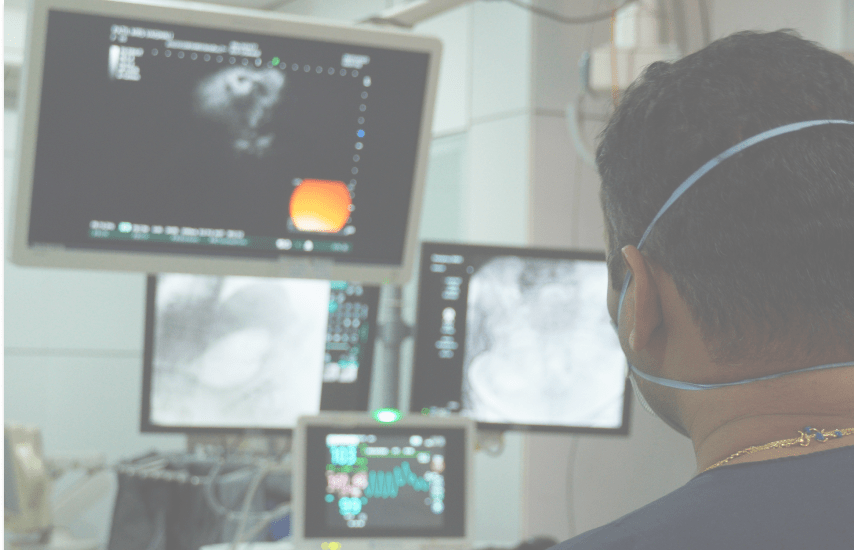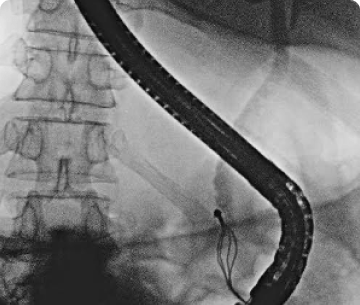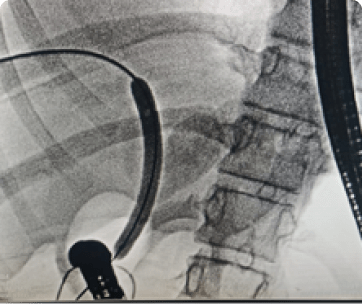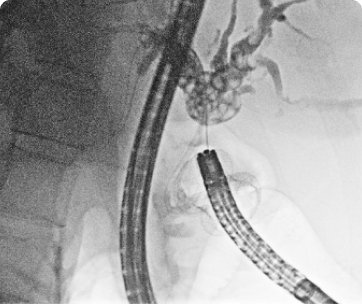PERORAL ENDOSCOPIC MYOTOMY
Peroral endoscopic myotomy (POEM) is a minimally invasive procedure for treating achalasia and other esophageal motility disorders. The procedure involves using an endoscope to access the esophagus and creating a tunnel in the lining of the esophagus through which the muscle can be cut to relieve constriction.

PERORAL ENDOSCOPIC MYOTOMY

Peroral endoscopic myotomy (POEM) is a minimally invasive procedure for treating achalasia and other esophageal motility disorders. The procedure involves using an endoscope to access the esophagus and creating a tunnel in the lining of the esophagus through which the muscle can be cut to relieve constriction.
Peroral endoscopic myotomy (POEM) is a minimally invasive surgical procedure for treating achalasia. This disorder affects the ability of the lower esophageal sphincter (LES) to relax and allow food to pass into the stomach. POEM involves using an endoscope to create a small incision in the lining of the esophagus, through which the muscles of the LES are cut.
1,11,1000+ CASES HANDLED
3 HI-TECH ENDOSCOPY DEVICES
5+ SPECIALIST GI ENDOSCOPIST
POEM is performed under general anesthesia. A flexible endoscope is passed through the mouth and into the esophagus, and a small incision is made in the lining of the esophagus to create a tunnel. The muscle layer of the esophagus is then cut to relieve constriction and improve swallowing.
POEM may be recommended for patients who have been diagnosed with achalasia or other esophageal motility disorders that are not responding to other treatments. Candidates for POEM should be in good overall health and able to tolerate general anesthesia.
Preparation for peroral endoscopic myotomy (POEM) typically involves several steps to ensure the safety and effectiveness of the procedure. Here are some general guidelines:
NPO: The patient will be asked to fast for several hours before the procedure to ensure an empty stomach. The healthcare provider will determine the exact duration of the fast, but it is typically at least six hours.
Medication adjustments: The patient may need to adjust or temporarily stop taking certain medications before the procedure, such as blood thinners or medications that affect the esophagus.
Medical history and physical exam: The healthcare provider will review the patient’s medical history and perform a physical exam to assess their overall health and ensure they are suitable for the procedure.
Anesthesia consultation: A consultation with an anesthesiologist may be required to discuss anesthesia options and to ensure that the patient is a suitable candidate for anesthesia.
Bowel prep: In some cases, the healthcare provider may recommend a bowel prep to clear the intestines of stool before the procedure.
Informed consent: The healthcare provider will discuss the risks, benefits, and alternatives to the procedure with the patient and obtain their informed consent.
POEM is generally considered a safe procedure with a low risk of complications. However, as with any procedure, there are risks, including bleeding, infection, perforation of the esophagus, and adverse reactions to anesthesia.
POEM is performed under general anesthesia. A flexible endoscope is passed through the mouth and into the esophagus, and a small incision is made in the lining of the esophagus to create a tunnel. The muscle layer of the esophagus is then cut to relieve constriction and improve swallowing.
POEM may be recommended for patients who have been diagnosed with achalasia or other esophageal motility disorders that are not responding to other treatments. Candidates for POEM should be in good overall health and able to tolerate general anesthesia.
Preparation for peroral endoscopic myotomy (POEM) typically involves several steps to ensure the safety and effectiveness of the procedure. Here are some general guidelines:
NPO: The patient will be asked to fast for several hours before the procedure to ensure an empty stomach. The healthcare provider will determine the exact duration of the fast, but it is typically at least six hours.
Medication adjustments: The patient may need to adjust or temporarily stop taking certain medications before the procedure, such as blood thinners or medications that affect the esophagus.
Medical history and physical exam: The healthcare provider will review the patient’s medical history and perform a physical exam to assess their overall health and ensure they are suitable for the procedure.
>Anesthesia consultation: A consultation with an anesthesiologist may be required to discuss anesthesia options and to ensure that the patient is a suitable candidate for anesthesia.
Bowel prep: In some cases, the healthcare provider may recommend a bowel prep to clear the intestines of stool before the procedure.
Informed consent: The healthcare provider will discuss the risks, benefits, and alternatives to the procedure with the patient and obtain their informed consent.
POEM is generally considered a safe procedure with a low risk of complications. However, as with any procedure, there are risks, including bleeding, infection, perforation of the esophagus, and adverse reactions to anesthesia.

PROCEDURES WE CONDUCT
FREQUENTLY ASKED QUESTIONS
FREQUENTLY ASKED QUESTIONS
Don’t wait!!
Get consulted with our GI specialist today
Book your appointment effortlessly.
ANTRANG KNOWLEDGE RESOURCE
ANTRANG KNOWLEDGE RESOURCE
get in touch
We are just a phone call away when you need us!









